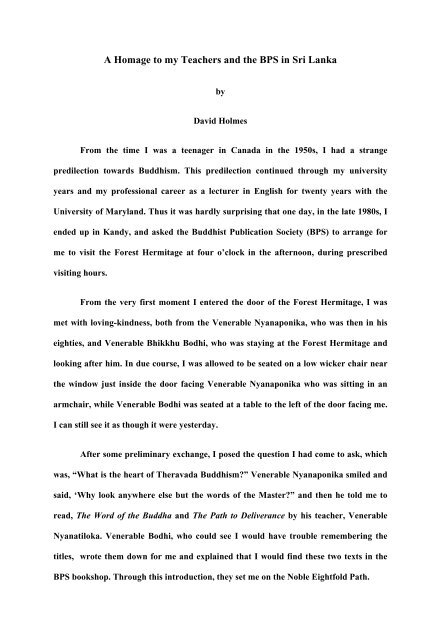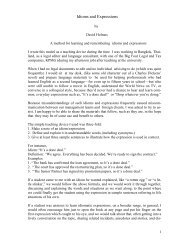A Homage to my Teachers and the BPS - Noblepath
A Homage to my Teachers and the BPS - Noblepath
A Homage to my Teachers and the BPS - Noblepath
Create successful ePaper yourself
Turn your PDF publications into a flip-book with our unique Google optimized e-Paper software.
A <strong>Homage</strong> <strong>to</strong> <strong>my</strong> <strong>Teachers</strong> <strong>and</strong> <strong>the</strong> <strong>BPS</strong> in Sri Lanka<br />
by<br />
David Holmes<br />
From <strong>the</strong> time I was a teenager in Canada in <strong>the</strong> 1950s, I had a strange<br />
predilection <strong>to</strong>wards Buddhism. This predilection continued through <strong>my</strong> university<br />
years <strong>and</strong> <strong>my</strong> professional career as a lecturer in English for twenty years with <strong>the</strong><br />
University of Maryl<strong>and</strong>. Thus it was hardly surprising that one day, in <strong>the</strong> late 1980s, I<br />
ended up in K<strong>and</strong>y, <strong>and</strong> asked <strong>the</strong> Buddhist Publication Society (<strong>BPS</strong>) <strong>to</strong> arrange for<br />
me <strong>to</strong> visit <strong>the</strong> Forest Hermitage at four o’clock in <strong>the</strong> afternoon, during prescribed<br />
visiting hours.<br />
From <strong>the</strong> very first moment I entered <strong>the</strong> door of <strong>the</strong> Forest Hermitage, I was<br />
met with loving-kindness, both from <strong>the</strong> Venerable Nyanaponika, who was <strong>the</strong>n in his<br />
eighties, <strong>and</strong> Venerable Bhikkhu Bodhi, who was staying at <strong>the</strong> Forest Hermitage <strong>and</strong><br />
looking after him. In due course, I was allowed <strong>to</strong> be seated on a low wicker chair near<br />
<strong>the</strong> window just inside <strong>the</strong> door facing Venerable Nyanaponika who was sitting in an<br />
armchair, while Venerable Bodhi was seated at a table <strong>to</strong> <strong>the</strong> left of <strong>the</strong> door facing me.<br />
I can still see it as though it were yesterday.<br />
After some preliminary exchange, I posed <strong>the</strong> question I had come <strong>to</strong> ask, which<br />
was, “What is <strong>the</strong> heart of Theravada Buddhism?” Venerable Nyanaponika smiled <strong>and</strong><br />
said, ‘Why look anywhere else but <strong>the</strong> words of <strong>the</strong> Master?” <strong>and</strong> <strong>the</strong>n he <strong>to</strong>ld me <strong>to</strong><br />
read, The Word of <strong>the</strong> Buddha <strong>and</strong> The Path <strong>to</strong> Deliverance by his teacher, Venerable<br />
Nyanatiloka. Venerable Bodhi, who could see I would have trouble remembering <strong>the</strong><br />
titles, wrote <strong>the</strong>m down for me <strong>and</strong> explained that I would find <strong>the</strong>se two texts in <strong>the</strong><br />
<strong>BPS</strong> bookshop. Through this introduction, <strong>the</strong>y set me on <strong>the</strong> Noble Eightfold Path.
2<br />
In many subsequent visits during <strong>the</strong> next five years it was always like this. The<br />
seating arrangement remained <strong>the</strong> same. I would ask a question <strong>and</strong> Venerable<br />
Nyanaponika would answer in a few words, usually quoting <strong>the</strong> Buddha from <strong>the</strong> texts,<br />
<strong>and</strong> Venerable Bodhi would explain, usually telling me where I could find appropriate<br />
references <strong>and</strong> resources.<br />
In those days, Venerable Nyanaponika was still walking <strong>and</strong> not showing visible<br />
signs of deteriorating health. He was a benevolent monk full of loving-kindness who<br />
became a role-model for many o<strong>the</strong>rs who followed his example. Venerable Bodhi, at<br />
that time, seemed <strong>to</strong> me <strong>to</strong> be a very perceptive <strong>and</strong> discerning Ph.D in philosophy who<br />
happened, not by coincidence, <strong>to</strong> have appeared in <strong>the</strong> right place at <strong>the</strong> right time with<br />
<strong>the</strong> right skills <strong>and</strong> aptitudes <strong>to</strong> carry on in <strong>the</strong> tradition of <strong>the</strong> Venerables<br />
Nyanaponika, Nyanatiloka <strong>and</strong>, of course, Nyanamoli, <strong>and</strong> o<strong>the</strong>rs.<br />
In those days, as well, <strong>the</strong>re was still a formidable amount of work <strong>to</strong> be done in<br />
translating <strong>and</strong> explicating <strong>the</strong> Pali texts in accordance with <strong>the</strong> Theravada tradition as<br />
a guide for monks <strong>and</strong> lay practitioners who were ready <strong>to</strong> underst<strong>and</strong>. Although those<br />
who were in a position <strong>to</strong> benefit may not have been so many at that time, now, a<br />
quarter of a century later, <strong>the</strong> influence of <strong>the</strong>se works has reached from Sri Lanka <strong>to</strong><br />
<strong>the</strong> rest of <strong>the</strong> world, especially now that many <strong>BPS</strong> books <strong>and</strong> booklets are beginning <strong>to</strong><br />
appear on <strong>the</strong> <strong>BPS</strong> Internet site www.bps.lk.<br />
Venerable Nyanatiloka’s declared mission in <strong>the</strong> first half of <strong>the</strong> last century<br />
was <strong>to</strong> disseminate a wider knowledge of <strong>the</strong> Buddha's teachings based on <strong>the</strong> Pali<br />
Canon. Now this aim seems <strong>to</strong> be coming <strong>to</strong> fruition in a way that no one, <strong>the</strong>n, could<br />
have ever imagined. This gives those who have followed in his footsteps great joy <strong>and</strong><br />
2
3<br />
satisfaction, <strong>and</strong> great praise is due <strong>to</strong> Venerable Bodhi who was able <strong>to</strong> finish <strong>the</strong><br />
work by doing what had <strong>to</strong> be done.<br />
Venerable Bodhi was always very kind <strong>to</strong> me. In addition <strong>to</strong> talking <strong>to</strong> me,<br />
warmly <strong>and</strong> patiently, at <strong>the</strong> Forest Hermitage, I occasionally corresponded with him<br />
during those years. In particular, he helped me, at a time when he was very busy with<br />
o<strong>the</strong>r more important work, <strong>to</strong> edit <strong>the</strong> text of a lecture I had been asked <strong>to</strong> give on <strong>the</strong><br />
Noble Eightfold Path, which followed <strong>the</strong> line of his own book of <strong>the</strong> same name,<br />
combined with some observations taken from Ledi Sayadaw, Venerable Nyanatiloka,<br />
<strong>and</strong> Venerable Nyanaponika.<br />
One cannot but be amazed at <strong>the</strong> quantity <strong>and</strong> quality of scholarly output<br />
produced by Venerable Bodhi <strong>and</strong> those who preceded him. The huge amount of work<br />
that Venerable Bodhi has done, often on <strong>the</strong> most difficult texts, will put him down in<br />
his<strong>to</strong>ry alongside his venerable teachers. These monks are, indeed, world treasures.<br />
His<strong>to</strong>rically, Venerable Nyanaponika’s <strong>and</strong> Venerable Bodhi’s selfless<br />
contributions in making <strong>the</strong> Dhamma better known in English for <strong>the</strong> benefit of o<strong>the</strong>rs<br />
have become synonymous with <strong>the</strong> development <strong>and</strong> fulfillment of <strong>the</strong> noble <strong>and</strong><br />
meri<strong>to</strong>rious mission of <strong>the</strong> <strong>BPS</strong>, a mission that is still being carried on <strong>to</strong> this day.<br />
Few people know that much of this early <strong>BPS</strong> work was done by lamplight at<br />
night at <strong>the</strong> Forest Hermitage at a time when <strong>the</strong>re was no electricity, <strong>and</strong> it was<br />
sometimes quite cold <strong>and</strong> damp in <strong>the</strong> rainy season. It was only relatively recently,<br />
under Venerable Bodhi, that solar panels with battery s<strong>to</strong>rage were installed <strong>to</strong> give at<br />
least 12 v. light <strong>and</strong> limited power <strong>to</strong> run a lap<strong>to</strong>p with an adapter. One would not think<br />
that <strong>the</strong>se famous monks, so well-known world-wide, lived <strong>and</strong> worked where even<br />
3
4<br />
water was sometimes in short supply. Such matters, however, did not curb <strong>the</strong>ir<br />
ardent devotion. Their lives serve as brilliant examples of <strong>the</strong> noble skills of teaching<br />
<strong>and</strong> educating people.<br />
On one of <strong>my</strong> visits <strong>to</strong> <strong>the</strong> <strong>BPS</strong>, it was suggested that it would be of benefit for me<br />
<strong>to</strong> meet Venerable Ampitiya Sri Rahula at Peradeniya University Vihara, nearby, <strong>and</strong>,<br />
in due course, this came <strong>to</strong> pass. It was a great blessing as well, for, in addition <strong>to</strong> having<br />
a thorough knowledge of <strong>the</strong> Buddha-Dhamma, Venerable Sri Rahula was a monk<br />
devoted <strong>to</strong> <strong>the</strong> practice of loving-kindness. A well-respected <strong>and</strong> much-revered men<strong>to</strong>r<br />
of younger monks, he was more devoted <strong>to</strong> showing <strong>and</strong> pointing <strong>the</strong> way than he was <strong>to</strong><br />
reading or writing about it. He used <strong>to</strong> end his letters <strong>to</strong> me “with millions of thoughts<br />
of loving-kindness.” Venerable Sri Rahula was yet ano<strong>the</strong>r radiant example of his time.<br />
Many who were influenced by him went on <strong>to</strong> become great teachers <strong>the</strong>mselves.<br />
From <strong>the</strong> first, Venerable Sri Rahula seemed <strong>to</strong> know just what <strong>to</strong> do <strong>to</strong> help me<br />
deepen <strong>my</strong> underst<strong>and</strong>ing. I clearly remember that, when his monastery, called "Forest<br />
Solitude," first opened, he invited me <strong>to</strong> come <strong>and</strong> stay as a layman in white. I lived with<br />
<strong>the</strong> monks like a novice, <strong>and</strong> he taught me <strong>the</strong> monastic practice. He used <strong>to</strong> say that as<br />
long as <strong>the</strong>re was a group of monks practicing <strong>the</strong> Dhamma <strong>the</strong> way it was practiced by<br />
<strong>the</strong> Lord Buddha <strong>and</strong> his disciples, Buddhism would never die. Every morning, he<br />
would take time <strong>to</strong> teach me what he could see I was ready <strong>to</strong> underst<strong>and</strong>. One day, he<br />
<strong>to</strong>ok me out in<strong>to</strong> <strong>the</strong> forest <strong>and</strong> sat me down on a massive log <strong>and</strong> started me in <strong>the</strong><br />
practice of <strong>the</strong> meditation on loving-kindness.<br />
During this time I came <strong>to</strong> feel that, although I was already a teacher, I wanted<br />
<strong>to</strong> be <strong>the</strong> same kind of teacher <strong>and</strong> practice <strong>the</strong> same kind of loving-kindness as<br />
Venerable Sri Rahula. From that time on, I changed <strong>my</strong> attitude <strong>to</strong>wards teaching <strong>and</strong><br />
4
5<br />
speaking <strong>and</strong> interacting with o<strong>the</strong>rs. Later, when visiting o<strong>the</strong>r temples <strong>and</strong> monastic<br />
sanctuaries, I often thought of <strong>the</strong> purity of <strong>the</strong> practice as it was regulated by<br />
Venerable Sri Rahula in <strong>the</strong> Forest Solitude Monastery.<br />
At that same time, Venerable Dhammavihari had just been ordained <strong>and</strong> was<br />
also resident in <strong>the</strong> Forest Solitude Monastery. Since he had been a university professor,<br />
we found we had much in common. Every morning, we would walk <strong>to</strong>ge<strong>the</strong>r <strong>and</strong><br />
discuss <strong>the</strong> Dhamma. He called me his bro<strong>the</strong>r in <strong>the</strong> Dhamma <strong>and</strong> was, by character,<br />
always warm <strong>and</strong> kind. By his manner, one would never have guessed that he was a<br />
famous scholar. The only giveaway was his voice, which still retained <strong>the</strong> distinctive<br />
<strong>to</strong>ne of a professor.<br />
Earlier, at <strong>the</strong> University in Peradeniya, I had also met Professor Lily de Silva<br />
<strong>and</strong> often visited with her <strong>and</strong> benefited from her wide knowledge <strong>and</strong> seemingly<br />
boundless kindness. She had recently been lecturing at Harvard on her sabbatical year<br />
<strong>and</strong> was now back at her regular job. Her knowledge of <strong>the</strong> texts was profound. I also<br />
gained much from her unspoken wisdom. I have always thought that she <strong>and</strong> Venerable<br />
Piyadassi have been <strong>the</strong> foremost in expressing <strong>the</strong> Dhamma in a plain English that<br />
normal people can underst<strong>and</strong>.<br />
Ano<strong>the</strong>r memory that remains fresh in <strong>my</strong> mind, from <strong>the</strong> early days, in <strong>the</strong><br />
Forest Hermitage, is <strong>the</strong> time that Venerable Bodhi <strong>and</strong> Venerable Nyanaponika <strong>to</strong>ld<br />
me that knowledge <strong>and</strong> study alone are not enough. Knowledge of <strong>the</strong> suttas had <strong>to</strong> be<br />
balanced with practice in <strong>the</strong> way <strong>the</strong> Buddha had explained. I remember asking <strong>the</strong><br />
Venerable Nyanaponika how he could write a whole shelf full of books without it<br />
interfering with <strong>the</strong> practice, <strong>and</strong> he said, “Just don’t hang on <strong>to</strong> it.” Scholars should<br />
balance study with practice; o<strong>the</strong>rwise, <strong>the</strong>y get lop-sided.<br />
5
6<br />
Thus far, I have shared some reminiscences from <strong>the</strong> past in homage <strong>and</strong><br />
respect <strong>to</strong> <strong>my</strong> teachers as I <strong>the</strong>n knew <strong>the</strong>m. But <strong>the</strong> past has passed, <strong>and</strong> what is left is<br />
<strong>the</strong> present leading in<strong>to</strong> <strong>the</strong> future. So now, before concluding, I’ll go on <strong>to</strong> make some<br />
comments on <strong>the</strong> <strong>BPS</strong>, limiting <strong>my</strong> observations <strong>to</strong> things that I have seen <strong>and</strong> known.<br />
In 2001, Bhikkhu Bodhi went <strong>to</strong> Singapore, <strong>and</strong> <strong>the</strong> following year returned <strong>to</strong><br />
America, due <strong>to</strong> a chronic headache condition that obstructed his work in Sri Lanka.<br />
He presently stays at Bodhi Monastery, in New Jersey (not named after himself!), where<br />
he is able <strong>to</strong> receive specialized medical help for his condition. After his departure, it<br />
<strong>to</strong>ok a while for <strong>the</strong> <strong>BPS</strong> <strong>to</strong> regain its balance <strong>and</strong> re-establish a solid footing.<br />
Physically, <strong>the</strong> building <strong>and</strong> staff remain in place <strong>and</strong> do what <strong>the</strong>y are intended <strong>to</strong> do.<br />
Venerable Bhikkhu Bodhi remains President <strong>and</strong> gives advice <strong>to</strong> <strong>the</strong> Edi<strong>to</strong>r <strong>and</strong><br />
Board of Direc<strong>to</strong>rs. The <strong>BPS</strong> is financially sound, based on donations from <strong>the</strong> past, <strong>and</strong><br />
<strong>the</strong> Board of Direc<strong>to</strong>rs maintains a steady h<strong>and</strong> on <strong>the</strong> helm. The noble virtues <strong>and</strong><br />
intentions of Venerable Nyanaponika are still <strong>the</strong> guiding-light.<br />
When one walks in<strong>to</strong> <strong>the</strong> <strong>BPS</strong> books<strong>to</strong>re <strong>the</strong>se days, one is amazed <strong>to</strong> see <strong>the</strong><br />
great number of books now published in Sinhala on sale alongside <strong>the</strong> range of English<br />
editions listed in <strong>the</strong> <strong>BPS</strong> booklist. New Sinhala translations of st<strong>and</strong>ard <strong>BPS</strong> texts are<br />
now being made available at subsidized prices. The reading library in <strong>the</strong> back of <strong>the</strong><br />
bookshop is packed with thous<strong>and</strong>s of Theravada books, many of <strong>the</strong>m now rare<br />
editions or in bound sets of early publications. There is also a computer <strong>the</strong>re with an e-<br />
library of texts <strong>and</strong> sound files of Dhamma talks by Theravada teachers from around<br />
<strong>the</strong> world.<br />
6
7<br />
Upstairs are <strong>the</strong> offices <strong>and</strong> a spacious meditation hall that could accommodate<br />
up <strong>to</strong> a hundred medita<strong>to</strong>rs. On November 11 th , 2006, <strong>the</strong> annual Dana was held <strong>the</strong>re<br />
for fifteen Sri Lankan <strong>and</strong> foreign monks, with about fifty lay supporters attending.<br />
Among <strong>the</strong> <strong>the</strong>mes discussed was our shared respect for <strong>the</strong> memory of Venerable<br />
Nyanaponika <strong>and</strong> those noble friends in <strong>the</strong> Dhamma who founded <strong>the</strong> Buddhist<br />
Publication Society almost half a century ago.<br />
Coming soon, a bicentennial edition is planned with a collection of essays <strong>and</strong><br />
talks on <strong>the</strong> importance of <strong>the</strong> Buddha-Dhamma for <strong>the</strong> present day. Venerable Bodhi’s<br />
good name will, hopefully, encourage a number of well-respected writers on Theravada<br />
Buddhism <strong>to</strong> contribute <strong>to</strong> this book.<br />
After <strong>the</strong> Dana, a noble-minded Sri Lankan gentleman said <strong>to</strong> me that Sri<br />
Lankan Buddhism had been greatly influenced by scholar/teachers like Venerable<br />
Nyanatiloka <strong>and</strong> Venerable Nyanaponika <strong>and</strong> o<strong>the</strong>rs, like Venerable Nyanamoli, who<br />
followed in <strong>the</strong> <strong>BPS</strong> tradition. Although <strong>the</strong> Tipitaka had long been translated in<strong>to</strong><br />
formal Sinhala <strong>and</strong> had been available for study, it could only be unders<strong>to</strong>od by a<br />
narrow range of highly-trained scholars. The form of <strong>the</strong> language, as written, was <strong>to</strong>o<br />
erudite for most people, who spoke <strong>the</strong> common, colloquial form of Sinhala. When <strong>the</strong><br />
English translations of <strong>the</strong> foreign monks started appearing, <strong>the</strong>y were more intelligible<br />
<strong>to</strong> <strong>the</strong> well-educated middle class Sinhalese who where fluent in English <strong>and</strong> thus<br />
enabled <strong>to</strong> obtain <strong>and</strong> develop a more comprehensive underst<strong>and</strong>ing of <strong>the</strong> teachings<br />
upon which <strong>the</strong>ir ancient Buddhist culture was based.<br />
In turn, some of <strong>the</strong>se well-educated Sri Lankans started translating <strong>BPS</strong> texts<br />
in<strong>to</strong> Sinhala <strong>and</strong> writing Dhamma books in Sinhala. Consequently, in <strong>the</strong> course of<br />
time, as more texts <strong>and</strong> teaching became available in Sinhala, a body of literature <strong>and</strong> a<br />
7
8<br />
tradition of practice grew up which had a positive influence on people nation-wide—<br />
monks <strong>and</strong> laypersons alike.<br />
In a nutshell, many Sri Lankans of that generation were better enabled <strong>to</strong><br />
develop on <strong>the</strong> path <strong>and</strong> subsequently serve as examples <strong>and</strong> teachers <strong>to</strong> <strong>the</strong> generations<br />
<strong>to</strong> come, <strong>and</strong> even <strong>to</strong> numerous people like me who came from all around <strong>the</strong> world <strong>to</strong><br />
<strong>the</strong> <strong>BPS</strong> in Sri Lanka <strong>to</strong> study <strong>and</strong> learn <strong>the</strong> practice of <strong>the</strong> Buddha-Dhamma.<br />
Indeed, as <strong>the</strong> Sri Lankan summary of events, ties-up <strong>and</strong> evaluates <strong>the</strong> <strong>BPS</strong>’<br />
contribution from a broader his<strong>to</strong>rical perspective than I could ever do, I think it apt <strong>to</strong><br />
conclude <strong>my</strong> observations here <strong>and</strong> end with <strong>the</strong> following ardent wish:<br />
“May <strong>the</strong> edi<strong>to</strong>r <strong>and</strong> worthy monks <strong>and</strong> staff of <strong>the</strong> <strong>BPS</strong> continue <strong>to</strong> work in<br />
harmony in disseminating <strong>the</strong> Buddha-Dhamma for <strong>the</strong> sake of those who want <strong>to</strong><br />
know, following <strong>the</strong> examples of <strong>the</strong>ir Theravada teachers of both <strong>the</strong> near <strong>and</strong> <strong>the</strong><br />
distant past, reaching all <strong>the</strong> way back <strong>to</strong> The Noble Tamer of Men.”<br />
8





